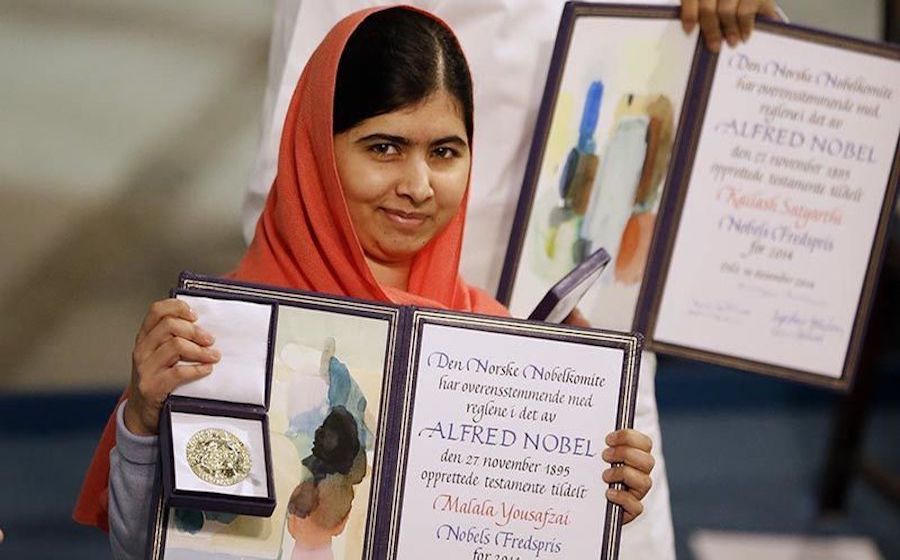Battling Injustice: How Female Nobel Peace Laureates Have Led the Way

In this world, which is so full of turbulence due to widespread injustice, the first thought of any person who has nurtured empathy for their fellow human beings is the thought of fighting that injustice. The concept of battling is central to human life.
In the many decades since its creation, the Nobel Peace Prize has been awarded to 104 individuals and 23 organizations, but only 16 women have been awarded the honor. In my new book Battling Injustice, I’ve set out to recount the magnificent sagas that these 16 women have scripted in their lives with a view to showing every person, male and female, how these women from modest beginnings could imbibe unbound love and empathy for their fellow human beings.
This love manifests in countless ways: as a matchless ability to rise to the occasion; as a steely resolve for waging relentless crusades against despots; by vehemently opposing wars and antipersonnel mines; supporting the restoration of human rights, particularly women’s and children’s rights; by holding congresses for peace; by warmly embracing the lowliest of the low, the underprivileged, the abandoned, the orphaned and all those in need of succor or solace; and above all, by sending a message across the globe of the inherent oneness of humanity, thereby knitting the whole world into one family.
Consider some of these women’s lives:
-Rigoberta Menchu Tum’s mother was raped repeatedly by army officers, and when she fainted from the brutality, she was injected with a serum to revive her back to consciousness and again raped and disfigured, repeatedly. The officers left her totally deformed, with several cuts on her body. Her body was then infested with worms; she succumbed to the torture shortly thereafter. After she died, soldiers urinated into her mouth, and her body was abandoned to be eaten by wild animals and dogs. It was a matter of great solace to Rigoberta that her mother had finally died and would not be tortured any further. I find it difficult to compose myself whenever my thoughts drift to Rigoberta. I constantly wonder how she could reconcile herself to her fate – how she could witness so stoically the lynching and burning of her brother, and the burning of her father at the Spanish embassy, how she could stomach her mother’s suffering at the hands of the army, and, after everything, how she could so bravely say: ‘With the help of our ancestors, we must prevail over the times we are living in.’ Such ghastly tragedies in one’s life should have driven one to insanity, but here was a tigress who braved such personal calamities in magnificent fashion.
-Malala Yousafzai said that her only regret about the attack was that she could not talk to her attackers before they shot her. She said she wished she could have informed them that whatever she had been doing was in accordance with Islam, as Islam gives equal rights of education to men and women, and that she would have implored them to renounce the path they had been following. ‘If girls are not to go to school, from where will they find lady doctors? When they ordain that women should only be treated by lady doctors, how can there be lady teachers for girls aspiring to be doctors if there were to be no schools for girls?’ asked Malala.
In Battling Injustice, the central message of each of the sixteen female Nobel peace laureates is: ‘Never submit to evil and suffer… instead, subdue evil with grit and determination.’
Grasping and conveying the courage of these women has been at the core of my entire effort. I have not penned abridged biographies of these eminent laureates, but included all relevant events from their lives that show the purity of their mind, their all-embracing empathy, and their spirit of self-sacrifice for the well-being of others. I tried to express the depth of human empathy, which I found in abundance in them all. Truly, each of them is an enigma in herself and has left an indelible mark on my psyche.
By taking a closer look at the incredible life stories of these 16 female Nobel Peace laureates, it is my hope that more people will be catapulted to a new height of self-awareness, and will start interacting with the world with a sense of urgency that leads to helping others for others’ sake. Doing so can eventually create feelings of elation and goodwill that truly elevate us all.
 ABOUT THE AUTHOR: Supriya Vani is an international journalist and human rights activist. Her mission in life is to work for world peace. She is also an advisory board member of the Hague Justice Portal.
ABOUT THE AUTHOR: Supriya Vani is an international journalist and human rights activist. Her mission in life is to work for world peace. She is also an advisory board member of the Hague Justice Portal.
To learn more about Battling Injustice and its author Supriya Vani, go here.
READ MORE STORIES THAT MOVE HUMANITY FORWARD
READ MORE STORIES THAT MOVE HUMANITY FORWARD
SIGN UP FOR MARIA’S SUNDAY PAPER


